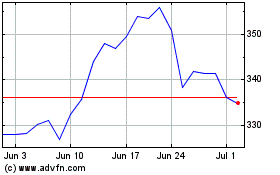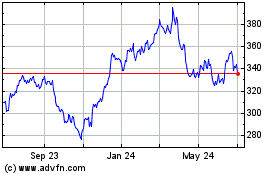Home Depot Files Antitrust Lawsuit Against Visa, MasterCard -- Update
June 15 2016 - 5:02PM
Dow Jones News
By Robin Sidel
Home Depot Inc. filed an antitrust lawsuit against Visa Inc. and
MasterCard Inc. reigniting claims from a decade ago that merchants
pay too much for debit- and credit-card transactions and adding new
contentions about the effectiveness of chip-based cards to reduce
fraud.
The lawsuit comes several years after Home Depot and hundreds of
other retailers opted out of a settlement, then valued at $7.25
billion, in a price-fixing case that addressed many of the same
issues.
This time, the do-it-yourself retailer also contends that Visa
and MasterCard colluded to prevent the adoption of new chip-based
cards that require consumers to enter a personal identification
number, or PIN, to authorize a transaction. "Visa and MasterCard
know perfectly well that a signature alone, without the additional
step of requiring a PIN, provides virtually no protection against
many types of payment card fraud," Home Depot said in the lawsuit
filed Monday in U.S. District Court for the northern district of
Georgia.
The new chip cards being rolled out in the U.S. are embedded
with a computer chip. This creates a unique code for each
transaction, reducing the chance that criminals can create
counterfeit cards if they hack into a retailer's payment
system.
The chip cards have long been used around the world, where they
often require a PIN instead of a signature.
U.S. bank executives have said that they don't want to burden
Americans with a PIN when they are using their credit cards at the
check-out line. The banks collect higher merchant fees for
signature credit-card transactions than PIN-based ones.
"While chip-and-PIN authentication is proven to be more secure,
it is less profitable for Visa, MasterCard, and their member banks
and it provides a greater threat to their market dominance," the
lawsuit claimed.
The legal action also contends that Visa and MasterCard, which
set the so-called interchange fees collected by banks, are engaged
in price-fixing that prevent competition for merchant acceptance.
"We had hoped to resolve our claims outside of litigation but those
efforts proved to be unsuccessful," Home Depot spokesman Stephen
Holmes said.
Visa said it is aware of the lawsuit. It is seeking to transfer
the case to a federal court in Brooklyn that is handling other
"opt-out" cases filed by merchants including Target Corp. and
7-Eleven Inc. Wal-Mart Stores Inc. also opted out of the 2012
merchant settlement, but later settled separately.
MasterCard said the lawsuit wasn't a surprise given Home Depot
opted out of the 2012 settlement. It also said it leaves the
decision on how to verify cardholder identity, via PIN or
signature, to the merchant and card-issuing financial institution.
"Regardless of how the cardholder's identity is confirmed, the chip
makes data much more secure, rendering it almost useless to create
fraudulent cards or transactions," MasterCard said,
The Home Depot lawsuit comes a month after Wal-Mart sued Visa
for the right to choose how customers authorize debit-card
purchases. The retailer wants customers to use a PIN, but Visa
requires that shoppers can have the choice between a PIN and a
signature.
--Paul Ziobro contributed to this article.
Write to Robin Sidel at robin.sidel@wsj.com
(END) Dow Jones Newswires
June 15, 2016 16:47 ET (20:47 GMT)
Copyright (c) 2016 Dow Jones & Company, Inc.
Home Depot (NYSE:HD)
Historical Stock Chart
From Mar 2024 to Apr 2024

Home Depot (NYSE:HD)
Historical Stock Chart
From Apr 2023 to Apr 2024
